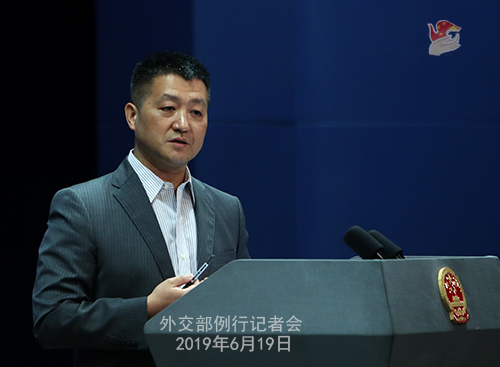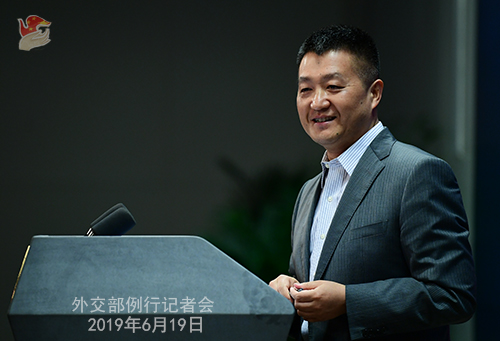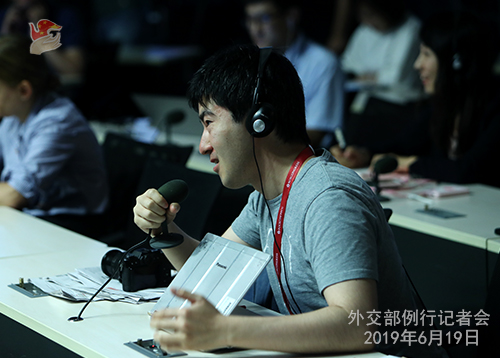| Foreign Ministry Spokesperson Lu Kang's Regular Press Conference on June 19, 2019 |
| 2019-06-19 19:35 |
|
Q: Can you share with us whether President Xi will depart today or tomorrow for his trip to North Korea? A: The press release by the International Department of the CPC Central Committee stated clearly that President Xi Jinping will pay a state visit to the Democratic People's Republic of Korea from June 20 to 21. Q: Could you reveal when exactly President Xi will leave for the DPRK? Will he leave tomorrow morning or afternoon? What are the specific plans for his visit? A: You may refer to earlier press release. As to specific events during this trip, we will keep you fully updated as usual. Q: President Xi agreed to a meeting on the sidelines of the G20 Osaka Summit in yesterday's phone call with President Trump. Has the agenda for the meeting been decided? President Trump said earlier that he would raise the topic of Hong Kong. Can you confirm that? President Trump said in an interview with TIME that the demonstrations in Hong Kong had a big impact on the SAR and Beijing. What's your comment? A: China and the US have both released information on the telephone call between President Xi and President Trump. President Trump said he looked forward to meeting with President Xi again on the sidelines of the G20 Osaka Summit to exchange views on bilateral relations and major issues of common concern. President Xi agreed to meeting with President Trump during the Osaka Summit to have an exchange of ideas on fundamental issues concerning bilateral relations. As to the exact agenda for the meeting, I could not foretell as I'm sure you understand, leaders will talk about whatever they see fit to discuss. Regarding whether President Trump will bring up what happened in the Hong Kong SAR recently, I will reiterate that in conducting exchanges with foreign countries, we are always open to enhance understanding through communication with those who, out of goodwill, are genuinely interested in China and policies taken by the Chinese Central Government and local governments. However, if anyone or any force attempts to interfere in China's internal affairs with prejudice and hidden political motives, China's attitude is clear-cut. We are resolutely against it. I haven't read what you quoted on Hong Kong. But I think you all have noted that President Trump stated clearly that regarding what happened in Hong Kong, he believes the Chinese Central Government and the SAR government are capable of working things out. Q: According to media reports, when talking about China-US trade frictions at a Senate hearing yesterday, US Trade Representative Lighthizer said that talks wouldn't work. I wonder if you have a comment? A: You may have noticed that during yesterday's telephone call with President Xi, President Trump said that the US attached importance to economic and trade relations with China. He also expressed hope for the two teams to communicate to find a solution to the current economic and trade differences at an early date. I believe the entire world would like to see the two sides reaching a deal. President Xi agreed that the two teams would maintain communication. As we repeatedly stated, a mutually-beneficial agreement between China and the US is not only in the interests of both peoples, but also the shared expectation of the international community. You quoted the remarks by USTR Ambassador Lighthizer. I don't know if you noted that Director Kudlow of the US National Economic Council said in an interview yesterday that US market reactions show that "talk is better than no talk". We have repeatedly emphasized that the economic and trade differences between China and the US can be solved through dialogue and consultation, as long as mutual respect, equality and mutual benefit is upheld as the precondition. The most important thing in consultations, as President Xi pointed out in the call, is to accommodate in an overall and balanced way each other's legitimate concerns and find a solution acceptable to both. Anything against this principle will lead nowhere. Q: Yesterday Russia and China blocked a US request to halt fuel deliveries to North Korea, saying that more time is needed to study the issue. Can you share more details on why China decided to hold the request, for example, what specific parts of the request require further study? A: First, on proceedings at the Security Council and its affiliate bodies, members always follow relevant rules of procedure and regulations. When it comes to fuel deliveries to the DPRK, decisions must be made by the sanctions committee after thorough discussions of solid evidence in accordance with relevant Security Council resolutions and sanctions committee regulations. Under current circumstances, relevant parties should take actions conducive to easing tensions, enhancing trust and facilitating political settlement of the Peninsula issue. Q: First, China's press release on the phone call between the Chinese and US heads of state said that President Xi hopes to exchange views on fundamental issues in bilateral relations with President Trump. What are the "fundamental issues"? Second, some reports say that Vice Foreign Minister Luo Zhaohui may be appointed the Chinese government's Special Representative for Korean Peninsula Affairs. Can you confirm that? A: On your first question, the two leaders will exchange views on fundamental issues in bilateral relations. I could not foretell specific items to be discussed. On your second question, considering China's important role in and major influence on the Korean Peninsula issue, a competent official will be appointed to this post. We will release information once we have it.
Q: According to Belt and Road Economics: Opportunities and Risks of Transport Corridors, a World Bank report released yesterday, China's Belt and Road Initiative (BRI) could speed up economic development and poverty alleviation in dozens of developing countries. Its full implementation could lift 32 million people out of moderate poverty. The report also commended the BRI for boosting global trade and investment. However, policy reforms are needed for greater transparency, better debt sustainability and less environmental, social and corruption risks. Do you have any comment on the report? A: We note the recently-released World Bank report. Since it was put forth six years ago, the BRI, with its fruitful outcomes, has become an international platform for extensive cooperation and a public good enjoying worldwide popularity. With goals and areas of cooperation dovetailing with development strategies of many developing countries, the BRI has enhanced these countries' economic development and people's well-being. The BRI broke infrastructure bottlenecks in many participating regions, enhanced connectivity and contributed to global trade facilitation and economic growth. The World Bank report made objective comments on it. Of course, we also note the advice you mentioned on risk management in the report, which I believe relevant Chinese authorities will carefully study. I'd like to stress that consensus was reached by all participants on high-quality BRI cooperation proposed by China in the second Belt and Road Forum for International Cooperation (BRF). China is committed to working with all partners under the concept of consultation and cooperation for shared benefits and the principle of openness, inclusiveness and transparency. We will carry out open, green and clean cooperation, and pursue high standard, people-centered and sustainable development. We will advance the implementation of the BRF outcomes, promote global partnership on connectivity, and strive for new outcomes in high-quality cooperation. In this sense, what we are doing is in sync with the advice in the World Bank report. Q: Regarding China-US trade talks, President Trump said on Twitter after the phone conversation with President Xi that their respective teams will begin talks prior to the meeting. Can you tell us when and where those talks will be held? A: I don't know about the US team. But on the Chinese side, I'd refer you to the Ministry of Commerce as it is the competent authority. We can see from yesterday's phone call that top-level consensus has been reached for the two teams to begin talks. Q: Media reports say China is still buying fuel from Iran despite possible US sanctions. It is said that super tankers loaded with Iranian fuel were headed to China in May and June. What's your comment? A: As we said, China and Iran maintain normal bilateral relations and economic and trade ties. Such normal cooperation should not be disrupted. Q: Is the Chinese team already in contact with the US team to prepare for trade discussions? Is China optimistic about the outcome of the meeting between the two heads of state at the G20 Summit? A: On your first question, I'd refer you to the Ministry of Commerce. On the second one, I cannot foresee whether China is optimistic about the prospect of the trade talks. But I'd like to reiterate that as four decades of diplomatic relations has proven, economic and trade differences between China and the US can surely be resolved through dialogue and consultation which, however, must be based on mutual respect, equality and mutual benefit. If the two sides will meet each other halfway in this spirit, I am confident that there will be positive outcomes. Q: President Trump officially announced his decision to run in the 2020 presidential election. I wonder what is your comment on that and how will it affect China-US trade talks? A: We note President Trump's decision to run for president, but we do not comment on what is a domestic affair of the US. Regarding its impact on China-US trade talks, as long as China and the US can meet each other halfway following the spirit of mutual respect, equality and mutual benefit, trade relations will be advanced and positive results that serve the interests of the two peoples and beyond will be achieved. *********************** You may have noticed that I am not wearing a tie today. That's because we had the temperature turned up a little with less air conditioning. We have also prepared some mini handheld fans and pamphlets on energy-conservation and emission-reduction for you. The MFA made these special arrangements as part of our efforts in the national energy-saving week. This week is the national energy-saving week under the theme of "saving energy for green development". Today is the national low-carbon day featuring "low carbon actions for a blue sky". These events aim to raise social awareness and enhance capability to save energy, promote a green lifestyle and green production, encourage participation in low-carbon actions, and introduce and foster a low-carbon fashion. These are important steps towards achieving low-carbon development, advancing ecological conservation and building a beautiful China. The MFA has been following and practicing the new concept of innovative, coordinated, green, open and shared development. Upholding a fine tradition of thriftiness, we have been practicing a low-carbon work style to help save energy and cut emissions. Building a green world is the shared hope of people in all countries. We hope to join in energy-conservation and emission-reduction efforts through everyday habits to look after the planet we all call home and ensure its sustainable development.
|
 |
|


